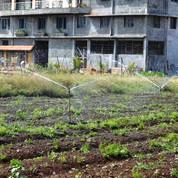Smallholder cotton farmers in the developing world, where over 100 million smallholder farmers are responsible for 90 percent of the world’s cotton production, urgently need education and support in basic agricultural techniques to reduce water footprint, says CottonConnect, a UK-based social enterprise pioneering a transparent and sustainable cotton supply chain from retailers to farmers to build a sustainable future for the cotton industry.

In connection with the World Water Week CottonConnect has released a report titled “More Crop Per Drop – Water Report on the Cotton Industry”, focusing on working with smallholder farmers to increase yield and maximise water efficiency.
Basic interventions such as farmer training and knowledge sharing on basic agricultural practices, have resulted in 30 percent reductions in water use among smallholder farmers and installing simple technologies, such as drip irrigation systems, have resulted in water savings of up to 60 percent, according to the report.
The report reveals that to protect the cotton industry, brands need to get involved in supporting smallholder farmers in the developing world. It asks brands to collaborate to map and ensure greater transparency and closer relationships across the supply chain; support farmer training programmes for basic interventions to reduce water footprints; and collaborate and help to fund initiatives to help drive cotton supply chain sustainability at scale.
CottonConnect has collaborated with major brands, including John Lewis, C&A Foundation along with the Better Cotton Initiative, to help improve relationships with farmers on the ground, improve resilience and share best practice in basic agricultural techniques and technologies, in cotton growing regions of the developing world.
The organization has also worked with 130,000 cotton farmers in India, China and Pakistan, and proved that basic interventions can make a huge difference to the water being used to grow cotton, one of the world’s most thirsty crops.
The report invites other brands and retailers to support education and training among smallholder farmers to increase impact and scale. It says that if companies work in collaboration with NGOs, governments and their competitors, they can help to scale-up these proven water conservation methods and drive sustainability improvements across the entire cotton supply chain.





